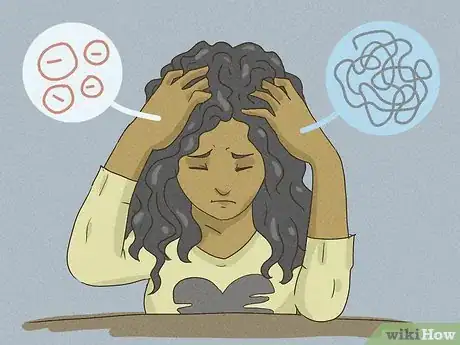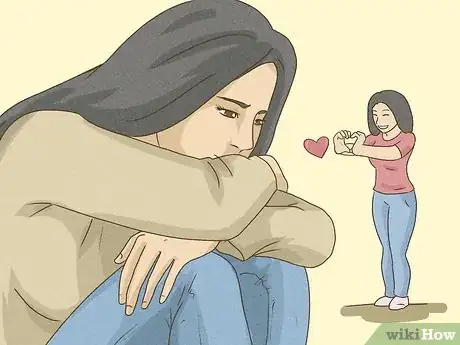This article was co-authored by Annie Lin, MBA. Annie Lin is the founder of New York Life Coaching, a life and career coaching service based in Manhattan. Her holistic approach, combining elements from both Eastern and Western wisdom traditions, has made her a highly sought-after personal coach. Annie’s work has been featured in Elle Magazine, NBC News, New York Magazine, and BBC World News. She holds an MBA degree from Oxford Brookes University. Annie is also the founder of the New York Life Coaching Institute which offers a comprehensive life coach certification program. Learn more: https://newyorklifecoaching.com
There are 11 references cited in this article, which can be found at the bottom of the page.
This article has been viewed 9,004 times.
You’ve probably heard of having compassion for other people, but do you have compassion for yourself? Self-compassion isn't talked about too much, but it’s a huge part of your mental health. It's about accepting yourself for who you are, despite your flaws or failures. Like with everything, building self-compassion takes practice and reflection, and it’s fine if you don’t know where to start. We’re here to answer all the questions you might have about it.
Steps
Expert Q&A
-
QuestionHow can I stop thinking negatively?
 Annie Lin, MBAAnnie Lin is the founder of New York Life Coaching, a life and career coaching service based in Manhattan. Her holistic approach, combining elements from both Eastern and Western wisdom traditions, has made her a highly sought-after personal coach. Annie’s work has been featured in Elle Magazine, NBC News, New York Magazine, and BBC World News. She holds an MBA degree from Oxford Brookes University. Annie is also the founder of the New York Life Coaching Institute which offers a comprehensive life coach certification program. Learn more: https://newyorklifecoaching.com
Annie Lin, MBAAnnie Lin is the founder of New York Life Coaching, a life and career coaching service based in Manhattan. Her holistic approach, combining elements from both Eastern and Western wisdom traditions, has made her a highly sought-after personal coach. Annie’s work has been featured in Elle Magazine, NBC News, New York Magazine, and BBC World News. She holds an MBA degree from Oxford Brookes University. Annie is also the founder of the New York Life Coaching Institute which offers a comprehensive life coach certification program. Learn more: https://newyorklifecoaching.com
Life & Career Coach Practice mindfulness to bring you back into the present moment. Remember, it's not possible to unwind the past. However, you can change how you think about it, so make a conscious choice about what you're focusing on.
Practice mindfulness to bring you back into the present moment. Remember, it's not possible to unwind the past. However, you can change how you think about it, so make a conscious choice about what you're focusing on. -
QuestionHow can I forgive myself for making a mistake?
 Annie Lin, MBAAnnie Lin is the founder of New York Life Coaching, a life and career coaching service based in Manhattan. Her holistic approach, combining elements from both Eastern and Western wisdom traditions, has made her a highly sought-after personal coach. Annie’s work has been featured in Elle Magazine, NBC News, New York Magazine, and BBC World News. She holds an MBA degree from Oxford Brookes University. Annie is also the founder of the New York Life Coaching Institute which offers a comprehensive life coach certification program. Learn more: https://newyorklifecoaching.com
Annie Lin, MBAAnnie Lin is the founder of New York Life Coaching, a life and career coaching service based in Manhattan. Her holistic approach, combining elements from both Eastern and Western wisdom traditions, has made her a highly sought-after personal coach. Annie’s work has been featured in Elle Magazine, NBC News, New York Magazine, and BBC World News. She holds an MBA degree from Oxford Brookes University. Annie is also the founder of the New York Life Coaching Institute which offers a comprehensive life coach certification program. Learn more: https://newyorklifecoaching.com
Life & Career Coach When those feelings come up, allow yourself to feel them completely instead of trying to escape from them. Breathe consciously through the physical and mental discomfort. Also, take personal responsibility for your part in the situation. Think whether there's any action you need to take to correct it, and think about what you can do differently in the future.
When those feelings come up, allow yourself to feel them completely instead of trying to escape from them. Breathe consciously through the physical and mental discomfort. Also, take personal responsibility for your part in the situation. Think whether there's any action you need to take to correct it, and think about what you can do differently in the future.
References
- ↑ https://greatergood.berkeley.edu/article/item/try_selfcompassion
- ↑ https://www.psychologytoday.com/us/blog/overcoming-destructive-anger/201609/what-makes-self-compassion-such-hard-sell
- ↑ https://self-compassion.org/the-three-elements-of-self-compassion-2/
- ↑ https://www.health.harvard.edu/mental-health/4-ways-to-boost-your-self-compassion
- ↑ Annie Lin, MBA. Life & Career Coach. Expert Interview. 25 March 2020.
- ↑ https://psychcentral.com/blog/9-ways-to-practice-self-compassion-when-you-have-depression/
- ↑ https://www.mindful.org/the-transformative-effects-of-mindful-self-compassion/
- ↑ Annie Lin, MBA. Life & Career Coach. Expert Interview. 25 March 2020.
- ↑ https://psychcentral.com/blog/9-ways-to-practice-self-compassion-when-you-have-depression/
- ↑ https://www.health.harvard.edu/mental-health/4-ways-to-boost-your-self-compassion
- ↑ https://www.helpguide.org/articles/healthy-living/the-mental-health-benefits-of-exercise.htm
- ↑ https://www.health.harvard.edu/newsletter_article/sleep-and-mental-health
- ↑ https://greatergood.berkeley.edu/article/item/try_selfcompassion
- ↑ https://psychcentral.com/blog/9-ways-to-practice-self-compassion-when-you-have-depression/
- ↑ https://greatergood.berkeley.edu/article/item/what_self_compassion_feels_like_in_your_body
- ↑ https://www.psychologytoday.com/us/blog/nurturing-self-compassion/201703/how-cultivate-more-self-compassion




























